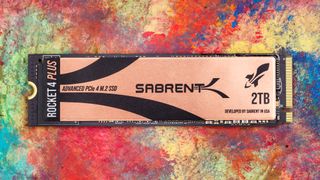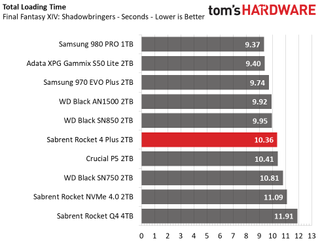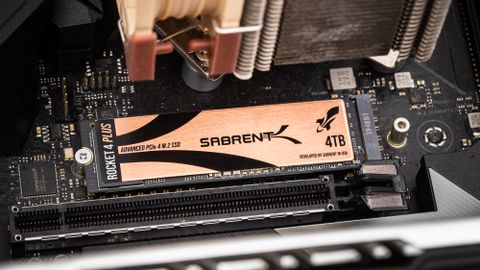Why you can trust Tom's Hardware
RATING: ★★★★ ½
PROS
+ Fast sequential performance
+ Competitive pricing
+ Large and consistent dynamic cache
+ Attractive design
+ Up to 5-year warranty
CONS
- 1-year warranty without registration
- Not quite as responsive or efficient as Samsung / WD
- No AES 256-bit encryption
- Slow write speed after write cache fills
OUR VERDICT
Sabrent’s 2TB Rocket 4 Plus delivers even faster performance than the 1TB model and is a solid pick that ranks it alongside the best, for less.

Comparison Products
We don’t have Samsung’s 2TB 980 Pro as it is still unavailable, but we included the 1TB model and do happen to have WD’s 2TB Black SN850 to throw in against the Sabrent Rocket 4 Plus at the higher capacity point. We also threw in the WD Black AN1500 and SN750, along with the Samsung 970 EVO Plus, Crucial P5, and Sabrent’s Rocket NVMe 4.0 and Rocket Q4.
Game Scene Loading - Final Fantasy XIV
Final Fantasy XIV Shadowbringers is a free real-world game benchmark that easily and accurately compares game load times without the inaccuracy of using a stopwatch.

Sabrent’s 2TB Rocket 4 Plus delivers responsive game load performance times, but competitors like Samsung’s 980 Pro and the much cheaper Adata’s XPG Gammix S50 Lite outpace it here.
Transfer Rates – DiskBench
We use the DiskBench storage benchmarking tool to test file transfer performance with our own custom blocks of data. Our 50GB dataset includes 31,227 files of various types, like pictures, PDFs, and videos. We copy the data set to a new folder and then follow-up with a read test of a newly-written 6.5GB zip file.


The Rocket 4 Plus broke the 1 GBps barrier while copying our 50GB folder of files, but its performance wasn’t up to par with WD’s Black SN850 or Samsung’s 980 Pro. However, the Rocket proves itself when reading back the 6.5GB .zip file with a sequential read performance that tops the chart at 3.4 GBps.
Trace Testing – PCMark 10 Storage Tests
PCMark 10 is a trace-based benchmark that uses a wide-ranging set of real-world traces from popular applications and everyday tasks to measure the performance of storage devices. The quick benchmark is more relatable to those who use their PCs for leisure or basic office work, while the full benchmark relates more to power users.






As we saw with the 1TB model, the Sabrent Rocket 4 Plus is more responsive than PCIe 3.0 competitors when it comes to most ordinary everyday tasks, and even when hammered with heavier workloads like content creation, but still, WD’s Black SN850 and Samsung’s 980 Pro continue to prove more responsive in PCMark 10’s application trace tests.
Synthetic Testing - ATTO / iometer
iometer is an advanced and highly configurable storage benchmarking tool while ATTO is a simple and free application that SSD vendors commonly use to assign sequential performance specifications to their products. Both of these tools give us insight into how the device handles different file sizes.










Sequential speed is the Sabrent Rocket 4 Plus’s strong suit, and its ATTO results show a sizable lead over the competition at most block sizes beyond 256KB a QD1. Peak throughput measured roughly 7.1/6.6 GBps read/write, but peak read throughput required increasing the block size to 1MB, up from the 128KB block size where we typically measure peak throughput. Still, the 2TB's write performance is unmatched.
The Rocket 4 Plus’s random performance at QD1 is very respectable; the device delivered the fastest 4K random write speeds we've seen. When upping the QD, the Sabrent Rocket 4 Plus’s performance peaks at roughly 580,000 random read/write IOPS on our test bench.
Sustained Write Performance and Cache Recovery
Official write specifications are only part of the performance picture. Most SSDs implement a write cache, which is a fast area of (usually) pseudo-SLC programmed flash that absorbs incoming data. Sustained write speeds can suffer tremendously once the workload spills outside of the cache and into the "native" TLC or QLC flash. We use iometer to hammer the SSD with sequential writes for 15 minutes to measure both the size of the write cache and performance after the cache is saturated. We also monitor cache recovery via multiple idle rounds.





Data collection with our 2TB drive was hard due to the controller's firmware and thermal throttling algorithms. This test pushes SSDs to the limit as we fill the drive completely with data in one long sustained workload, and we caution that most users won't encounter this type of workload during normal use.
We found ourselves retesting the cache multiple times with varying levels of preconditioning and idle timing to finally attain a result that reflects a large dynamic cache, something we ordinarily don’t have to do. Most runs came up short of what we expected to see. Our logs recorded a small 40GB cache, but relatively fast sustained speeds beyond the cache.
When we got a few runs where the large dynamic SLC cache showed itself, the logs showed thermal throttling at the 300GB point and beyond. That was with a 120mm fan directly over top of the M.2 drive, mind you. To completely prevent thermal throttling from occurring, we threw on the motherboard’s M.2 heatsink and used an additional 120mm fan for good measure.
Finally, after multiple failed attempts, we recorded a decent run. From empty, write speeds averaged 6.8 GBps up until the Rocket 4 Plus wrote roughly 710GB. After that, the write speed degraded to an average speed of 1,135 MBps until full. When it comes to the 2TB model’s recovery, the Rocket 4 Plus recovered at a pace of roughly 50GB-100GB per minute.
Power Consumption and Temperature
We use the Quarch HD Programmable Power Module to gain a deeper understanding of power characteristics. Idle power consumption is an important aspect to consider, especially if you're looking for a laptop upgrade. Some SSDs can consume watts of power at idle while better-suited ones sip just milliwatts. Average workload power consumption and max consumption are two other aspects of power consumption, but performance-per-watt is more important. A drive might consume more power during any given workload, but accomplishing a task faster allows the drive to drop into an idle state more quickly, ultimately saving energy.
We also monitor the drive’s temperature via the S.M.A.R.T. data and an IR thermometer to see when (or if) thermal throttling kicks in and how it impacts performance. Bear in mind that results will vary based on the workload and ambient air temperature.





Sabrent’s Rocket 4 Plus scores well in terms of its efficiency, scoring similarly to the Adata XPG Gammix S50 Lite. But with the second-highest average power consumption and a recording of over 8.5W in peak power draw, the Rocket 4 Plus can get quite thirsty under load.
Idle power consumption is well regulated, and the 2TB model should remain cool when hit with average workloads. However, with more flash, the 2TB model tends to hit its thermal throttle point a little faster than the 1TB model. As such, we recommended using it with a heat sink for full performance, or else that 70-degree Celsius thermal limit could potentially impact performance during heavy sustained workloads.
MORE: Best SSDs
MORE: How We Test HDDs And SSDs
MORE: All SSD Content
Current page: 2TB Performance Results
Prev Page 4TB Performance Results Next Page 1TB Performance Results
Sean is a Contributing Editor at Tom’s Hardware US, covering storage hardware.
-
Alvar "Miles" Udell Remember when Samsung drives were the fastest AND the cheapest? 2021 and still well above the $100/TB level...Reply -
Chris Fetters Spends much of the review (& most of the conclusion) talking about how the 2TB model is able to get significantly more performance out of the new Phison E18 controller and as such, THAT'S the one you should buy... to then go and EXCLUSIVELY only show benchmark results of the 1TB drive in the review itself... -_- ... I am not amused.Reply -
seanwebster Reply
I reviewed both capacities at once, but the 2TB results will show in an update soon, painting a better picture.Chris Fetters said:Spends much of the review (& most of the conclusion) talking about how the 2TB model is able to get significantly more performance out of the new Phison E18 controller and as such, THAT'S the one you should buy... to then go and EXCLUSIVELY only show benchmark results of the 1TB drive in the review itself... -_- ... I am not amused. -
prolfe Reply
Sean,seanwebster said:I reviewed both capacities at once, but the 2TB results will show in an update soon, painting a better picture.
It sounds like you're saying you did all the work required to make a complete review, but decided to hold some back and get a second article out of it for those sweet sweet clicks. I'm a longtime toms reader and that won't change anytime soon. Also note that I didn't accuse you but rather said it sounds like a certain thing. If I'm correct it does sound a little shady. You didn't call the article "Rocket 4 Plus 1 TB Review" and didn't mention anywhere in the article that there was more data for the 2 TB coming. Also, it's not like the 2TB isn't out yet, so you can't say you're holding it back til the 2 TB comes out. I appreciate your work and thank you for writing this article. Please take the comment in the spirit it is given: as constructive criticism of a potential business practice that I personally find distasteful. I hope you'll consider refraining from this in the future. -
seanwebster Reply
I typically review one capacity at a time and then release another capacity at a later date because it takes longer to test. The 2TB's results were mostly done when I wrapped up the review, but I was having a little trouble with something, hence the delay. But, since the 2TB results will be published soon, and again, I already had the majority of my data, I wrote the conclusion based on both capacities from the getgo.prolfe said:Sean,
It sounds like you're saying you did all the work required to make a complete review, but decided to hold some back and get a second article out of it for those sweet sweet clicks. I'm a longtime toms reader and that won't change anytime soon. Also note that I didn't accuse you but rather said it sounds like a certain thing. If I'm correct it does sound a little shady. You didn't call the article "Rocket 4 Plus 1 TB Review" and didn't mention anywhere in the article that there was more data for the 2 TB coming. Also, it's not like the 2TB isn't out yet, so you can't say you're holding it back til the 2 TB comes out. I appreciate your work and thank you for writing this article. Please take the comment in the spirit it is given: as constructive criticism of a potential business practice that I personally find distasteful. I hope you'll consider refraining from this in the future. -
Makaveli Not liking the endurance drop from E16 drives at 1TB that do 1,800 TBW to now 700TBW.Reply
also the E16 Corsair MP600 has AES 256-bit encryption.
Waiting for your review of the Corsair Core and Pro models. -
prolfe Reply
Thanks for the explanation and glad to hear it was something completely understandable. You keep making good articles and I'll keep reading!seanwebster said:I typically review one capacity at a time and then release another capacity at a later date because it takes longer to test. The 2TB's results were mostly done when I wrapped up the review, but I was having a little trouble with something, hence the delay. But, since the 2TB results will be published soon, and again, I already had the majority of my data, I wrote the conclusion based on both capacities from the getgo. -
RedCat888 (HIGUYS9090) ReplyAlvar Miles Udell said:Remember when Samsung drives were the fastest AND the cheapest? 2021 and still well above the $100/TB level...
I mean you can get a 1TB NVME for $100, and even a 1TB sata drive for 80-90 bucks, it's just that the increase in speed makes it more expensive -
thdm Nice review update. I'd been looking at the 2TB Rocket 4 plus for a little while.Reply
My interest in this SSD was at least in part because I was planning to run it in a laptop (MacBook Pro 2015) and being PCIe 3.0 was hoping that even though it's overkill and has more cores driving high performance for PCIe 4.0, that being a 12nm finfet design fabbed at TSMC that it might pull off nicely reduced overall power than other solutions for PCIe3.0.
The Sabrent site seems to indicate one needs a heatsink if running with a PCIe4.0 board, implying PCIe3.0 does/might not?
Any chance you can run some comparisons on PCIe3.0 with power consumption numbers? One would hope that it beats at least well proven PCIe3.0 designs on 28nm -
escksu ReplyChris Fetters said:Spends much of the review (& most of the conclusion) talking about how the 2TB model is able to get significantly more performance out of the new Phison E18 controller and as such, THAT'S the one you should buy... to then go and EXCLUSIVELY only show benchmark results of the 1TB drive in the review itself... -_- ... I am not amused.
IMHO, don't go too crazy over benchmarks. Unless you have more than 1 drive in your system, you will only be either transferring from/to RAM or another partition within the same drive.
You won't find windows or your apps loading much faster than even PCIE 3.0 drive (itself isn't really alot faster than SATA in daily usage cases.).
